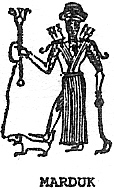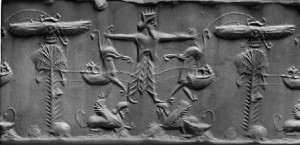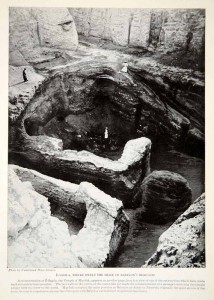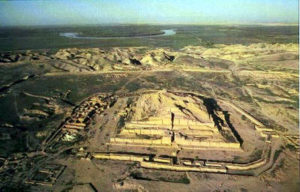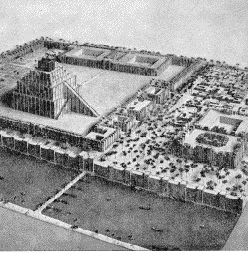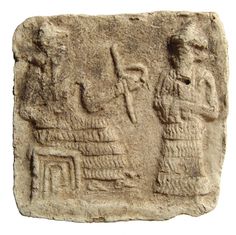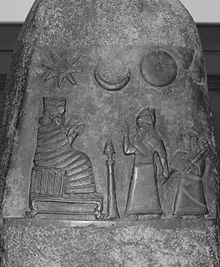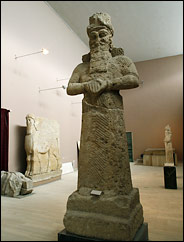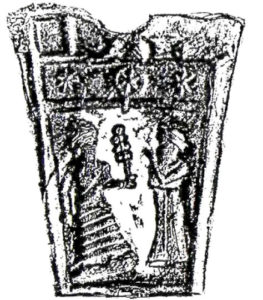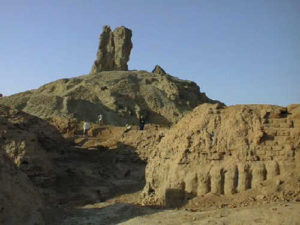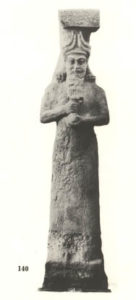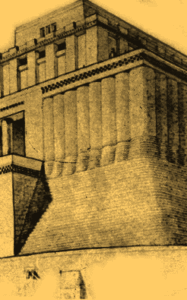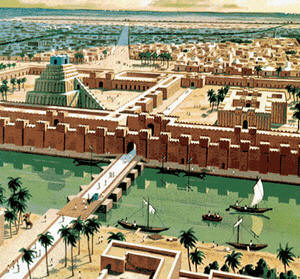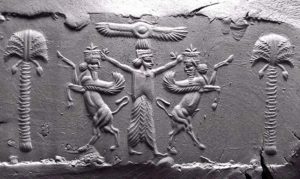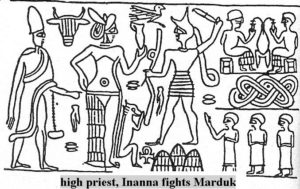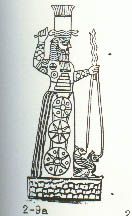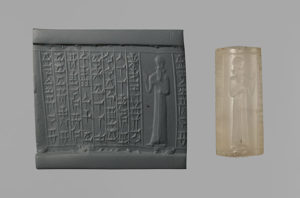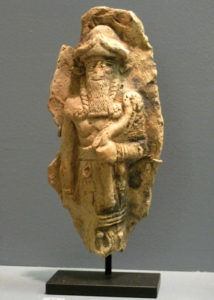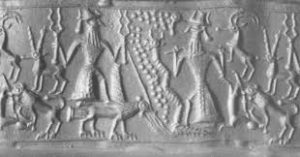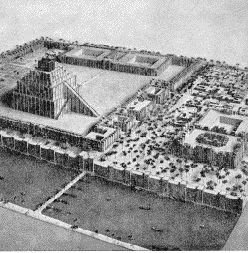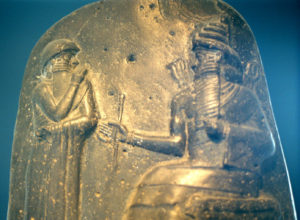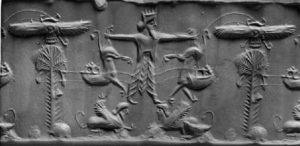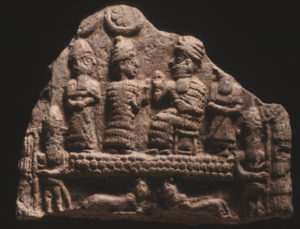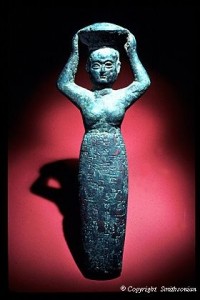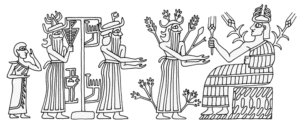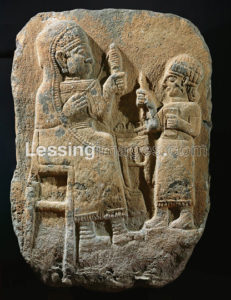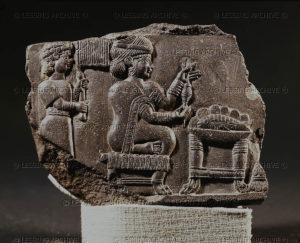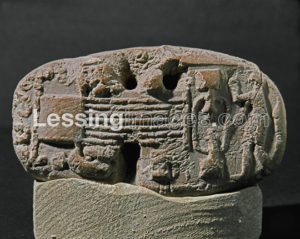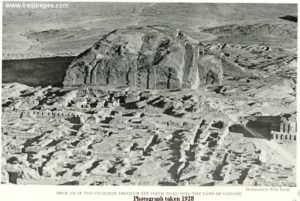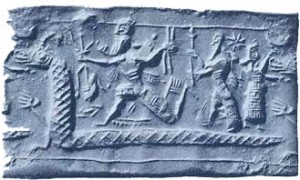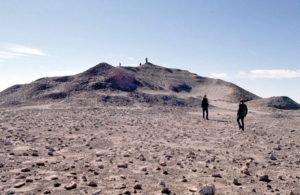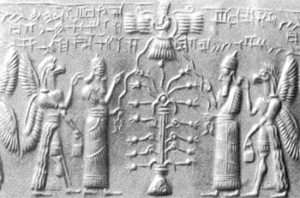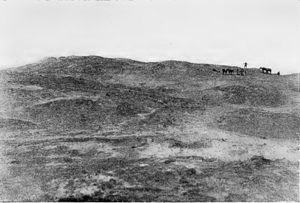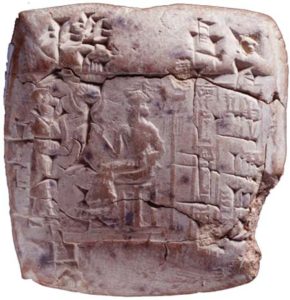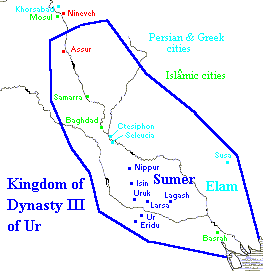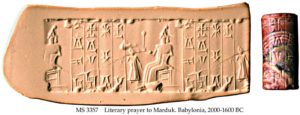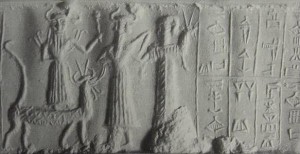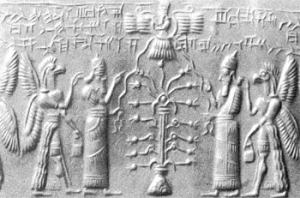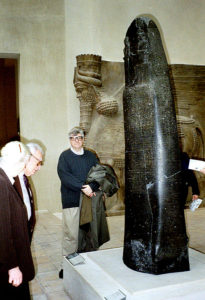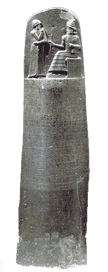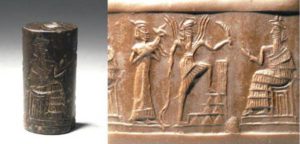Unknown web source
Tag Archives: Texts
Early Years of Nebuchadnezzar (ABC 5)
Cuneiform tablet mentioning the capture of Jerusalem in 597 (text; British Museum)
The Chronicle Concerning the Early Years of Nebuchadnezzar II (“Jerusalem Chronicle”; ABC 5) is one of the historiographical texts from ancient Babylonia. It deals with several subjects, but the reference to the capture of Jerusalem in 597 BCE has received most attention. No less important is the description of Nebuchadnezzar‘s campaigns against the Egyptian king Necho II, who had tried to conquer Syria (‘Hatti’).
The translation was adapted from A.K. Grayson, Assyrian and Babylonian Chronicles (1975) and Jean-Jacques Glassner, Mesopotamian Chronicles (Atlanta, 2004).
Translation
| Obverse |
|
1. “In the twenty-first year [605/604;note 1] the king of Akkad[Nabopolassar] stayed in his own land, Nebuchadnezzar his eldest son, the crown-prince, |
|
2. mustered the Babylonian army and took command of his troops; he marched to Karchemiš which is on the bank of the Euphrates, |
|
3. and crossed the river to go against the Egyptian army which lay in Karchemiš. |
|
4. They fought with each other and the Egyptian army withdrew before him. |
|
5. He accomplished their defeat and beat them to non-existence. As for the rest of the Egyptian army |
|
6. which had escaped from the defeat so quickly that no weapon had reached them, in the district of Hamath |
|
7. the Babylonian troops overtook and defeated them so that not a single man escaped to his own country. |
|
8. At that time Nebuchadnezzar conquered the whole area of Hamath. |
|
9. For twenty-one years Nabopolassar had been king of Babylon, |
|
10. when on 8 Abu[15 August 605] he went to his destiny; in the month of Ululu Nebuchadnezzar returned to Babylon |
|
11. and on 1 Ululu [7 September] he sat on the royal throne in Babylon. |
|
12. In the accession year Nebuchadnezzar went back again to the Hatti-land and until the month of Šabatu |
|
13. marched unopposed through the Hatti-land; in the month of Šabatu he took the heavy tribute of the Hatti-territory to Babylon. |
|
14. In the month of Nisannu he took the hands of Bêl (Marduk) and the son of Bêl (Nabu) and celebrated the Akitu festival. |
|
15. In the first year of Nebuchadnezzar [604/603]in the month of Simanu he mustered his army |
|
16. and went to the Hatti-territory, he marched about unopposed in the Hatti-territory until the month of Kislîmu. |
|
17. All the kings of the Hatti-land came before him and he received their heavy tribute. |
|
18. He marched to the city of Aškelon and captured it in the month of Kislîmu. |
|
19. He captured its king and plundered it and carried off spoil from it. |
|
20. He turned the city into a mound and heaps of ruins and then in the month of Šabatu he marched back to Babylon. |
|
21. In the second year [603/602] in the month of Ajaru the king of Akkad gathered together a powerful army and marched to the land of Hatti. |
|
22. …] he threw down, great siege-towers he [… |
|
23. …] from the month of Ajaru until the mon[th of …] he marched about unopposed in the land of Hatti. |
|
About four lines missing |
|
Reverse |
|
Several lines missing |
|
1′. In the third year [602/601] the king of Akkad left and |
|
2′. in the month of […] on the thirteenth day, [the king’s brother] Nabû-šuma-lišir […] |
|
3′. The king of Akkad mustered his troops and marched to the Hatti-land. |
|
4′. and brought back much spoils from the Hatti-land into Akkad. |
|
5′. In the fourth year [601/600] the king of Akkad mustered his army and marched to the Hatti-land. In the Hatti-land they marched unopposed. |
|
6′. In the month of Kislîmu he took the lead of his army and marched to Egypt. The king of Egypt heard it and mustered his army. |
|
7′. In open battle they smote the breast of each other and inflicted great havoc on each other. The king of Akkad turned back with his troops and returned to Babylon. |
|
8′. In the fifth year [600/599] the king of Akkad stayed in his own land and gathered together his chariots and horses in great numbers. |
|
9′. In the sixth year [599/598] in the month of Kislîmu the king of Akkad mustered his army and marched to the Hatti-land. From the Hatti-land he sent out his companies, |
|
10′. and scouring the desert they took much plunder from the Arabs, their possessions, animals and gods. In the month of Addaru the king returned to his own land. |
|
11′. In the seventh year [598/597], the month of Kislîmu, the king of Akkad mustered his troops, marched to the Hatti-land, |
|
12′. and besieged the city of Judah and on the second day of the month of Addaru he seized the city and captured the king [Jehoiachin; note 2]. |
|
13′. He appointed there a king of his own choice [Zedekiah], received its heavy tribute and sent to Babylon. |
|
14′. In the eight year [597/596], the month of Tebetu the king of Akkad marched to the Hatti-land as far as Karchemiš [… |
|
15′. …] in the month of Šabatu the king returned to his own land. |
|
16′. In the ninth year [596/595], the month of […] the king of Akkad and his troops marched along the bank of the Tigris […] |
|
17′. the king of Elam […] |
|
18′. the king of Akkad […] |
|
19′. which is on the bank of the Tigris he pitched his camp. While there was still a distance of one day’s march between them, |
|
20′. the king of Elam was afraid and, panic falling on him, he returned to his own land. |
|
21′. In the tenth year [595/594] the king of Akkad was in his own land; from the month of Kislîmu to the month of Tebetu there was rebellion in Akkad. |
|
22′. With arms he slew many of his own army. His own hand captured his enemy. |
|
23′. In the month of […] he marched to the Hatti-land, where kings and […]-officials |
|
24. came before him and he received their heavy tribute and then returned to Babylon. |
|
25. In the eleventh year [594/593] in the month of Kislîmu, the king of Akkad mustered his troops and marched to the Hatti-land. |
Note 1:
The story starts during the wars after the sack of Nineveh in 612 and the fall of the Assyrian empire. The Egyptian king Necho II tried to conquer Assyria’s western provinces, which is sometimes called Hatti in this chronicle. Nabopolassar and Nebuchadnezzar claimed this part for themselves.
Note 2:
Cf. 2 Kings 24.8-17 (tr. American Bible Society):
“Jehoiachin was eighteen years old when he became king of Judah, and he ruled only three months from Jerusalem. […] King Nebuchadnezzar of Babylonia sent troops to attack Jerusalem soon after Jehoiachin became king. During the attack, Nebuchadnezzar himself arrived at the city. Jehoiachin immediately surrendered, together with his mother and his servants, as well as his army officers and officials. Then Nebuchadnezzar had Jehoiachin arrested. These things took place in the eighth year of Nebuchadnezzar’s rule in Babylonia.
The Lord had warned that someday the treasures would be taken from the royal palace and from the temple, including the gold objects that Solomon had made for the temple. And that’s exactly what Nebuchadnezzar ordered his soldiers to do. He also led away as prisoners the Jerusalem officials, the military leaders, and the skilled workers, ten thousand in all. Only the very poorest people were left in Judah.
Nebuchadnezzar took Jehoiachin to Babylon, along with his mother, his wives, his officials, and the most important leaders of Judah. He also led away 7,000 soldiers, 1,000 skilled workers, and anyone who would be useful in battle. Then Nebuchadnezzar appointed Jehoiachin’s uncle Mattaniah king of Judah and changed his name to Zedekiah.”
The date in this Biblical story (the eighth year of Nebuchadnezzar) is contradicted by this chronicle and the Biblical book of Jeremiah, which both state that it was the seventh year:
Here is a list of the number of the people of Judah that Nebuchadnezzar took to Babylonia as prisoners: in his seventh year as king, he took 3,023 people; in his eighteenth year as king, he took 832 from Jerusalem; in his twenty-third year as king, his officer Nebuzaradan took 745 people. So, Nebuchadnezzar took a total of 4,600 people from Judah to Babylonia.
[Jeremiah 52.28-30
tr. American Bible Society]
The discrepancy has not been explained.
Contract for Loan of Money, Fourteenth year of Nabopolassar, 611 B.C.
(Texts: All Artifacts, Color Coding, & Writings in Bold Type With Italics Inside Parenthesis, are Added by Editor R. Brown, not the Authors, Translators, or Publishers!)
(gods in blue)
This is a mortgage on real estate in security for a loan. The interest was at the rate of eleven and one-third per cent.
ONE mana of money, a sum belonging to Iqisha-Marduk,
son of Kalab-Sin, (is loaned) unto Nabu-etir,
son of _____, son of _____.
Yearly the amount of the mana shall increase its sum by seven shekels of money.
His field near the gate of Bel (Marduk) is Iqisha-Marduk’s pledge.
(This document bears the name of four witnesses, and is dated) at Babylon,
Tammuz twenty-seventh, in the fourteenth year of Nabopolassar,
(the father of Nebuchadnezzar).
Early Years of Nabopolassar (ABC 2)
The translation on this webpage was adapted from A.K. Grayson,
Assyrian and Babylonian Chronicles
(1975) and Jean-Jacques Glassner,
Mesopotamian Chronicles
(Atlanta, 2004)
(Texts: All Artifacts, Color Coding, & Writings in Bold Type With Italics Inside Parenthesis, are Added by Editor R. Brown, not the Authors, Translators, or Publishers!)
(gods in blue … mixed-breed demigods in teal)
The Chronicle Concerning the Early Years of Nabopolassar (ABC 2) is one of the historiographical texts from ancient Babylonia. It deals with Nabopolassar‘s capture of Babylon, his accession as king and his war against the Assyrians. This chronicle belongs to one large text that continued with the Fall of Nineveh Chronicle (ABC 3) and the Late Years of Nabopolassar (ABC 4).
Translation
|
1 In the month of […] Nabopolassar, having sent troops to Babylon, at night |
|
2 entered the city and they did battle within the city all day. |
|
3 They inflicted a defeat on Assyria. The garrison of Sin-šarra-iškun fled to Assyria. |
|
4 The city was entrusted to […]. On the twelfth day of the month Ulûlu the army of Assyria |
|
5 went down to Akkad, entered Šasanaku, set fire to the temple |
|
6 and plunderded it. And in the month Tašrîtu the gods of Kiš (Kish) went to Babylon. |
|
7 The Nthe day, the army of Assyria went to Nippur and Nabopolassar retreated before them. |
|
8 The army of Assyria and the Nippureans followed him to Uruk, |
|
9 they did battle against Nabopolassar in Uruk, and retreated before Nabopolassar. |
|
10 In the month Ajaru the army of Assyria went down to Akkad. On the twelfth day of the month Tašrîtu |
|
11 when the army of Assyria[12] had marched against Babylon and the Babylonians |
|
12 had come out of Babylon; on that day[11] they did battle against the army of Assyria, |
|
13 inflicted a major defeat upon the army of Assyria, and plundered them. |
|
14 For one year there was no king in the land. On the twenty-sixth day of the month Arahsamna [23 November 626] Nabopolassar |
|
15 ascended the throne in Babylon. The accession year of Nabolossar (626/625): in the month Addaru [24 February/23 March] |
|
16-17 Nabopolassar returned to Susa the gods of Susa whom the Assyrians had carried off and settled in Uruk. |
|
—————————————— |
|
18 The first year of Nabopolassar (625/624): On the seventeenth of the month Nisannu panic overcame the city. |
|
19 Šamaš (Shamash / Utu) and the gods of Šapazzu went to Babylon. |
|
20 On the twenty-first day of the month Ajaru [14 May 625] the army of Assyria entered Raqmat and carried off the booty. |
|
21 On the twentieth day of the month […] the gods of Sippar went to Babylon. |
|
22 On the ninth day of the month Âbu [30 July 625] Nabopolassar and his army marched to Raqmat. |
|
23 He did battle against Raqmat but did not capture the city. Instead, the army of Assyria arrived so |
|
24 he retreated before them and withdrew. |
|
—————————————— |
|
25 The second year of Nabopolassar (624/623): at the beginning of the month Ulûlu [9 August 624] the army of Assyria |
|
26 went down to Akkad and camped by the Banitu canal. |
|
27 They did battle against Nabopolassar but achieved nothing |
|
28 […] and withdrew. |
|
—————————————— |
|
29 The third year (623/622): On the eight day of the month […] Der rebelled against Assyria. On the fifteenth day of the month Tašrîtu [11 October] |
|
30 [the Assyrian general] Itti-ili joined battle with Nippur. Afterward the king of Assyria went down to Akkad |
|
31 with his troops and took possession of Der; he took out its treasures and had them sent to Nippur. |
|
32 He pursued Itti-ili, ravaged Uruk?, and set up a garrison at Nippur. |
|
33 He went up from beyond the Euphrates and set out |
|
34 toward Assyria. He ravaged […]nu and set out for Nineveh. |
|
35 […] who had come to do battle against him |
|
36 [..wh]en they saw him they bowed down before him. |
|
37 […] |
|
38 The rebel king […] |
|
39 one hundred days […] |
|
40 […] when […] |
|
41 […] rebel […] |
Šamaš-šuma-ukin (ABC 1)
Tiglath-Pileser III on a relief in the British Museum
(Texts: All Artifacts, Color Coding, & Writings in Bold Type With Italics Inside Parenthesis, are Added by Editor R. Brown, not the Authors, Translators, or Publishers!)
(gods in blue …mixed-breed demigods in teal…)
The Chronicle on the Reigns from Nabû-Nasir to Šamaš-šuma-ukin (ABC 1) is one of the historiographical texts about ancient Assyria and Babylonia. It deals with the resistance of an increasingly stronger Babylon, supported by Elam, against Assyria, beginning with the reign of the Babylonian king Nabû-Nasir (747-734) and culminating in the accessions of Aššurbanipal in Assyria and Šamaš-šuma-ukin in Babylonia in 668.
The text is preserved on two copies that are now in the British Museum; one of these copies was written in 499 BCE, the twenty-second year of king Darius I the Great. (It is the only Neo-Babylonian chronicle that is preserved on more than one copy.) The best of these measures 193 mm long and 158 mm wide, which is extremely large; this made it possible to create two columns (cf. ABC 7, the Nabonidus Chronicle, which may have been written by the same scribe). It is from Babylon. The other fragments are from Sippar and may belong to one and the same broken, large tablet. A parallel text that contains variant information can be found here.
|
Column I |
Translation of Column I
|
1 “The third year of Nabû-nasir (745/744), king of Babylon: |
|
2 Tiglath-Pileser [III] ascended the throne in Assyria. |
|
3 In that same year the king of Assyria went down to Akkad |
|
4 plundered Rabbilu and Hamranu |
|
5 and abducted the gods of Šapazza. |
|
—————————————— |
|
6 In the time of Nabû-nasir Borsippa |
|
7 committed hostile acts against Babylon but the battle which Nabû-Nasir |
| 8 waged against Borsippa is not written.[1] |
|
—————————————— |
|
9 The fifth year of Nabû-nasir (743/742): Humban-Nikaš |
|
10 ascended to the throne in Elam. |
|
—————————————— |
|
11 The fourteenth year (734/733): Nabû-nasir fell ill and went to his destiny in his palace. |
|
12 For fourteen years Nabû-nasir ruled Babylon. |
|
13 Nabû-nadin-zeri, his son, ascended the throne in Babylon. |
|
—————————————— |
|
14 The second year (732/731): Nabû-nadin-zeri was killed in a rebellion. |
|
15 For two years Nabû-nadin-zeri ruled Babylon. |
|
16 Nabû-šuma-ukin, a district officer and leader of the rebellion, ascended the throne. |
|
17 For one month and two days, Nabû-šuma-ukin ruled Babylon. |
|
18 Nabû-mukin-zeri, the Amukanite, removed him from the throne and seized the throne for himself. |
|
—————————————— |
|
19 The third year of Nabû-mukin-zeri (729/728): Tiglath-pileser, |
|
20 having come down to Akkad, |
|
21 ravaged Bit-Amukanu and captured Nabû-mukin-zeri. |
|
22 For three years Nabû-mukin-zeri ruled Babylon. |
|
23 Tiglath-pileser ascended the throne in Babylon. |
|
—————————————— |
| 24 The second year (727/726): Tiglath-pileser went to his destiny in the month Tebêtu. |
| 25 For <eighteen>[2] years Tiglath-pileser ruled Akkad. |
|
26 and Assyria. For two of these years he ruled in Akkad. |
|
27 On the twenty-fifth of the month Tebêtu, Šalmaneser in Assyria |
| 28 and Akkad ascended the throne. He ravaged Samaria [the capital of Israel]. |
|
—————————————— |
|
29 The fifth year (722/721): Šalmaneser went to his destiny in the month Tebêtu. |
|
30 For five years Šalmaneser ruled Akkad and Assyria. |
|
31 On the twelfth day of the month Tebêtu, Sargon ascended the throne in Assyria. |
| 32 In the month Nisannu, Marduk-apla-iddina [3] ascended the throne in Babylon. |
|
—————————————— |
|
33 The second year of Marduk-apla-iddina (720/719): Humban-Nikaš, king of Elam, |
|
34 did battle against Sargon, king of Assyria, in the district of Der, |
|
35 effected Assyria’s retreat, and inflicted a major defeat upon it. |
|
36 Marduk-apla-iddina and his army, who to the aid of |
| 37 the king of Elam had gone, did not reach the battle in time so Marduk-apla-iddina withdrew.[4] |
|
—————————————— |
|
38 The fifth year of Marduk-apla-iddina (717/716): Humban-Nikaš, king of Elam, went to his destiny. |
|
39 For twenty-six years Humban-nikaš ruled Elam. |
|
40 Šutur-Nahhunte, his sister’s son, ascended the throne in Elam. |
|
41 From the accession year of Marduk-apla-iddina until the tenth year |
|
42 Assyria was belligerent towards Marduk-apla-iddina. |
|
—————————————— |
|
43 The tenth year (712/711): Marduk-apla-iddina |
|
44 wrecked and plundered |
|
45 Bit-[…]ri. |
Note 1:
This means that thee author of the chronicle was unable to find a description that he could include.
Note 2:
The scribe left a some room unused because he was unable to find the number of regnal years. ‘Eighteen’ is a reconstruction.
Note 3:
The Biblical Merodach-Baladan. In fact, his accession took place in the next year.
Note 4:
In other sources, both the Assyrian king and his Babylonian colleague claim victory.
Translation of Column II
| 1 The twelfth year of Marduk-apla-iddina (710/709): Sargon went down to Akkad and |
|
2 did battle against Marduk-apla-iddina. |
| 3 Marduk-apla-iddina retreated before him and fled to Elam.[1] |
| 4 For twelve years Marduk-apla-iddina ruled Babylon. |
|
5 Sargon ascended the throne in Babylon. |
|
—————————————— |
| 6-11 [2] The first year of Sennacherib (704/703) […] Marduk-apla-iddina […] [too broken] |
|
12 The second year of Sennacherib (703/702), he went down to Akkad. Before Kiš, he joined battle with Marduk-apla-iddina. Before him, Marduk-apla-iddina retreated and fled to Guzummanu. In Babylon, Sennacherib entered the palace of Marduk-apla-iddina and the royal treasury […] he plundered, but |
|
19 Sennacherib did not disperse the Babylonians. |
|
20 He pursued Marduk-apla-iddina |
|
21 […] the territory […] but Marduk-apla-iddina remained undiscoverable. Sennacherib plundered his land and |
|
22 Larak and Sarrabanu he took. |
|
23 When he withdrew, Sennacherib put Bêl-ibni on the throne in Babylon. |
|
—————————————— |
|
24 The first year of Bêl-ibni (702/701): Sennacherib |
|
25 ravaged Hirimma and Hararatum. |
|
—————————————— |
|
26 The third year of Bêl-ibni (700/699): Sennacherib, to Akkad |
|
27 he went down and plundered Akkad. |
|
28 He led away to Assyria Bêl-ibni and his officers. |
|
29 For three years Bêl-ibni ruled Babylon. |
|
30 Sennacherib, Aššur-nadin-šumi, his son, |
|
31 he put on the throne in Babylon. |
|
—————————————— |
|
32 The first year of Aššur-nadin-šumni (699/698): Šutur-Nahhunte, king of Elam, |
| 33 was seized by his brother, Hallušu-Inšušinak and Hallušu-Inšušinak shot the door in his face.[3] |
|
34 For eighteen years Šutur-Nahhunte ruled Elam. |
|
35 Hallušu-Inšušinak ascended the throne in Elam. |
|
—————————————— |
|
36 The sixth year of Aššur-nadin-šumni (694/693): Sennacherib |
|
37 went down to Elam and Nagitum, Hilmu, |
|
38 Pillatum, and Huppapanu, he ravaged and |
|
39 plundered. Afterwards, Hallušu-Inšušinak, king of Elam, |
|
40 marched to Akkad and entered Sippar at the end of the month Tašrîtu. |
|
41 He slaughtered its inhabitants. Šamaš (Shamash / Utu) did not go out of Ebabbar (his residence in Sippar). |
|
42 Aššur-nadin-šumni was taken prisoner and transported to Elam. |
|
43 For six years, Aššur-nadin-šumni ruled Babylon. |
|
44 The king of Elam put[45] Nergal-ušezib in Babylon |
|
45 on the throne. He effected an Assyrian retreat. |
|
—————————————— |
| 46 The first year of Nergal-ušezib (693/692): On the sixteenth day of the month Du’ûzu |
|
47 Nergal-ušezib captured Nippur, plundered and sacked it. |
|
48 On the first day of the month Tašrîtu the army of Assyria entered Uruk and |
Note 1:
He was to return later.
Note 2:
For the reconstruction of lines 6-18, see John Brinkman, “The Babylonian Chronicle revisited” in T. Abusch, J. Huehnergard, P. Steinkeller (eds.): Lingering over words. Studies in ancient Near Eastern literature in honor of William L. Moran (1990 Atlanta).
Note 3:
Probably, this odd statement means that he was taken prisoner.
Translation of Column III
|
1 plundered the gods and inhabitants of Uruk. |
|
2 After the Elamites had come and carried off[3] the gods |
| 3 and inhabitants of Uruk Nergal-ušezib[2] in the district of Nippur on the seventh day of the month Tašrîtu |
| 4 did battle against the army of Assyria. He was taken prisoner in the battlefield and |
|
5 transported to Assyria. For one year -precisely: six months- Nergal-ušezib |
|
6 ruled Babylon. On the twenty-sixth day of the month Tašrîtu |
| 7 the subjects of Hallušu-Inšušinak, king of Elam, rebelled against him. The door in his face[1] |
|
8 they shut and they killed him. For six years Hallušu-Inšušinak ruled Elam. |
|
9 Kudur-Nahhunte ascended the throne in Elam. Afterwards Sennacherib |
|
10 went down to Elam. From Raši to |
|
11 Bit-Burnaki, he ravaged and plundered it. |
| 12 Mušezib-Marduk ascended the throne in Babylon. |
|
—————————————— |
| 13 The first year of Mušezib-Marduk (692/691): On the seventeenth day of the month Âbu, |
|
14 Kudur-Nahhunte, king of Elam, was taken prisoner in a rebellion and killed. For ten months |
|
15 Kudur-Nahhunte ruled Elam. Humban-nimena in Elam |
|
16 ascended the throne. In an unknown year Humban-nimena |
|
17 mustered the troops of Elam and Akkad[16] and battle against Assyria in Halule |
|
18 he did. He effected an Assyrian retreat. |
|
—————————————— |
| 19 The fourth year of Mušezib-Marduk (689/688): On the fifteenth day of the month Nisannu |
|
20 Humban-nimena, king of Elam, was stricken by paralysis and |
|
21 his mouth was so affected that he could not speak. |
| 22 On the first day of the month Kislîmu the city of Babylon was captured. Mušezib-Marduk |
|
23 was taken prisoner and transported to Assyria. |
| 24 For four years, Mušezib-Marduk ruled Babylon.[2] |
| 25 On the seventh day of the month Addaru Humban-nimena, king of Elam, died. |
|
26 For four years, Humban-nimena, ruled Elam. |
|
27 Humban-haltaš ascended the throne in Elam. |
|
—————————————— |
| 28 The eighth year of there not being a king in Babylon (681/680):[3] on the third day of the month Du’ûzu, |
|
29 the gods of Uruk went from Elam to Uruk. |
|
30 On the twenty-third day of the month Tašrîtu, at the noon hour, Humban-Haltaš, king of Elam, at |
|
31 became paralyzed and died at sunset. For eight years Humban-Haltaš |
|
32 ruled Elam. |
|
33 Humban-Haltaš the second, his son, ascended the throne. |
| 34 On the twentieth day of the month Tebêtu, Sennacherib, king of Assyria, |
|
35 was killed by his son in a rebellion. For twenty-four years Sennacherib |
|
36 ruled Assyria. After the twentieth day of the month Tebêtu |
| 37 the rebellion continued in Assyria until the second day of the month Addaru. |
|
38 On the eighteenth day of the month Addaru Esarhaddon, his son, ascended the throne in Assyria. |
|
—————————————— |
|
39 The first year of Esarhaddon (680/679): when[40] Nabû-zer-kitti-lišir, governor of the Sealand, |
|
40 had gone upstream, he encamped against Ur, but did not capture the city. |
|
41 Instead he fled from the Assyrian officers and went back into Elam. |
|
42 In Elam the king of Elam took him prisoner and put him to the sword. |
|
43 In an unknown month the governor […] in Nippur. |
| 44 In the month Ulûlu, Ištaran (Ninurta) and the gods of Der |
|
45 went[45] from […] to Der […]. |
| 46 went to Dur-Šarrukin […]. [4] |
|
47 In the month Adarru […]. |
|
—————————————— |
|
48 In the second year(679/678): the major-domo [conscripted troops in Akkad…] |
|
49 In that same year Arza was captured and sacked. The people were plundered, the king and his son were taken prisoner. |
| 50 There was a slaughter in Buššua and there was a slaughter of the Cimmerians in Šubuhn.] [5] |
|
—————————————— |
Note 1:
This remarkable statement probably means that he was taken prisoner.
Note 2:
Babylon was sacked by Sennacherib, an event that is not recorded in this chronicle.
Note 3:
In fact, Sennacherib ruled over the country, but he was not recognized, because he had sacked Babylon.
Note 4:
The capital of Assyria.
Note 5:
Restoration based on ABC 14.
Translation of Column IV
|
1 The third year [of Esarhaddon] (678/677): […]-ahhe-šullim, the governor of Nippur, and |
| 2 Šamaš-ibni, the Dakkurean, were transported to Assyria and executed in Assyria. |
|
—————————————— |
|
3 The fourth year (677/676): Sidon was captured and sacked. |
| 4 In that same year: the major-domo conscripted troops in Akkad. |
|
—————————————— |
| 5 The fifth year (676/675): On the second day of the month Tašrîtu the army of Assyria |
|
6 captured Baza[5]. In the month Tašrîtu the head of [Abdi-Milkutti] the king of Sidon |
| 7 was cut off and conveyed to Assyria. In the month Addaru the head of [Sanduarri] the king |
|
8 of Kundu and Sissu was cut off and conveyed to Assyria. |
|
—————————————— |
|
9 The sixth year (675/674): The king of Elam entered Sippar and a massacre took place. Šamaš (Shamash / Utu) |
| 10 did not come out of Ebabbar. The Assyrian marched to Milidu. On the seventh day of the month Ulûlu |
|
11 Humban-haltaš, king of Elam, without becoming ill, died in his palace. |
|
12 For five years, Humban-haltaš ruled Elam. |
|
13 Urtak, his brother, ascended the throne in Elam. |
|
14 In an unknown month Šuma-iddina, the governor of Nippur, |
|
15 and Kudurru, the Dakurrean, were transported to Assyria. |
|
—————————————— |
| 16 The seventh year (674/673): On the fifth day of the month Addaru the army of Assyria was defeated in Egypt. |
|
17 In the month Addaru, Ištar (Inanna) of Akkad and the gods of Akkad |
|
18 left Elam and entered Akkad on the tenth day of the month Addaru. |
|
—————————————— |
| 19 The eighth year of Esarhaddon (673/672): On the TEXT BROKEN[1] day of the month Tebêtu |
|
20 Šubria was captured and sacked. |
| 21 In the month Kislîmu its booty entered Uruk. |
|
22 On the fifth day of the month Addaru the king’s wife died. |
|
—————————————— |
| 23 The tenth year (671/670): In the month Nisannu the army of Assyria marched to Egypt TEXT BROKEN [1] |
|
24 On the third, sixteenth and eighteenth days of the month Du’uzu |
|
25 -three times- there was a massacre in Egypt. It was sacked and its gods were abducted. |
|
26 On the twenty-second day Memphis, the royal city, was captured and |
| 27 abandoned by its king [Taharqo]. The king’s son and brother were taken prisoner. |
|
28 The city was sacked, its inhabitants plundered, and its booty carried off. |
|
—————————————— |
|
29 The eleventh year (670/669): In Assyria the king put his numerous officers to the sword. |
|
—————————————— |
|
30 The twelfth year (669/668): The king of Assyria marched to Egypt but |
| 31 became ill on the way and went to his destiny on the tenth day of the month Arahsamna. |
|
32 For twelve years Esarhaddon ruled Assyria. |
|
33 Šamaš-šuma-ukin and Aššurbanipal, his two sons, ascended the throne in Babylon and Assyria respectively. |
|
—————————————— |
| 34 The accession year of Šamaš-šuma-ukin (668/667): In the month Ajaru |
| 35 Bêl and the gods of Akkad went out[36] from Aššur |
|
36 and on the fourteenth/twenty-fourth of the month Ajaru they entered Babylon. |
|
37 In that same year Kirbitu was taken and its king captured. |
|
38 On the twentieth day of the month Tebêtu, Bêl-etir, judge of Babylon, was taken prisoner and executed. |
|
—————————————— |
| 39 The first edition, written according to the pattern tablet, checked and collated.[2] |
|
40 Tablet of Ana-Bêl-eriš, son of Liblutu, |
|
41 descendant of Ur-Nanna. Written by Ea-nadin, son of |
|
42 Ana-Bêl-eriš, descendant of Ur-Nanna. Babylon, |
| 43 the N+6th [day of the month …], the twenty-second year of Darius, king of Babylon and all lands. |
Note 1:
This means that the scribe had no access to a correct copy.
Note 2:
This is the colophon of the text.
Nabû-šuma-iškun I Text (Version A)
(Texts: All Artifacts, Color Coding, & Writings in Bold Type With Italics Inside Parenthesis, are Added by Editor R. Brown, not the Authors, Translators, or Publishers!)
(gods in blue …mixed-breed demigods in teal...)
The following, very fragmentary text from Uruk, is a chronographic document dealing with the history of Babylonia in the eighth century BCE, and especially the demise of king Nabû-šuma-iškun, who died in 748, after he had broken all written and unwritten laws of his civilization. The text was already damaged in Antiquity: the scribe notes several breaks in the original he was copying.
Translation
Column iMarduk-apla-usur […] the Chaldaean. |
|
[…] the Tigris […] |
|
[…] a messenger […] he killed and […]. |
|
[…] |
|
Forced labor and corvée were imposed and […] slave. |
|
and bread, the food offering for the fifth day that he had seized, he used up and […]. |
|
the boat Idhedu […] for the Esagila (Marduk’s ziggurat / temple / residence in Babylon). |
Column ii(…) |
|
on the order of the BREAK lords Nabû and (father) Marduk, he went into the […] inside the house and |
|
no longer went into battle nor started into the field. |
|
In the third year, again, he brought the statue of Nanaya (Nabu’s spouse), the goddess of the Ezida (residence of Nabu & Nanaya in Borsippa), the beloved of Nabû, into the Bit mummi but |
|
kept Nabû in Babylon and had the ceremonies of the evening before and those of the day if the eššešu-festival celebrated in only one day. |
|
He covered the fine garment of Nabû with the fine garment of Bêl (Marduk) of the month Šabatu. |
|
Dressed as the latter, he proposed Bêl’s marriage to Tašmetu (Nabu’s spouse). |
|
Unshaven, he mutilated the fingers of his apprentice scribe, and, wearing fine gold, he entered into Bêl’s cella of offering […]. |
|
A leek, a thing forbidden in the Ezida, he brought to the temple of Nabû and gave to eat to the one “entering the temple” (i.e., the priest). |
|
Ea (Enki), the lord of wisdom, whose dwelling place was founded with pure heaven and earth, |
|
he made him get up from the dwelling place, which befitted his great divinity, and made him sit in the exalted gateway of Bêl. |
|
He removed Madanu, “Bêl of Babylon” (Marduk), his favorite god, from his seat and made him leave. |
|
Without the authority of […] this city, he did as he pleased, |
|
of […]ri, son of […], who |
|
He […] BREAK […] |
|
[…] she who sits on the throne […] seven lions. |
|
[…] he unleashed and […] allowed to roam freely. |
|
He had her grasp […] he had her leashed. |
|
He had […] of Ištar (Inanna) […] disconnected. |
|
[…] to the granary of the verdant countryside he offered […] a dust storm […]. |
|
He presented […] Belet-duri […]. |
|
[…] Nabû, detained several nights in Babylon and […] seated among […] without destinies. |
|
[..] Babylon […] which he destroyed by fire. |
|
[…] the great lord Marduk […] he went to Marduk in place of the king and |
|
[…] he spoke […] was placed. |
|
[…] kept in order […]. |
|
[…] the kneeling lord […] he made sing. |
Column iii[…] Nin […] |
|
When the proud lord, the freedom of Babylon, Borsippa, and Cutha |
|
and the sworn agreements of Enlil-ina-mati, the son of KU[…] BREAK, the governor of Larak, in their time had established |
|
and when he had offered sacrifices at Babylon, Borsippa, and Cutha before Bêl, Nabû, and Nergal. |
|
Year after year, he made unbearable their burden of slaughter, robbery, murder, corvée, and forced labor. |
|
In only one day, he burned alive sixteen Cutheans at Zababa’s (Ninurta) gate in the heart of Babylon. |
|
He delivered inhabitants of Babylon to Hatti and Elam as a token of respect. |
|
He made the inhabitants of Babylon with woman, children, and servants go out and settled them into the countryside. |
|
He heaped up the houses of Babylon’s inhabitants BREAK BREAK into piles of rubble, and he turned them into royal property. |
|
The main street, the avenue of Šarur, his lord’s beloved, who passes through the streets of his city in the month of Ululu, |
|
its passage he blocked off and turned into royal property, making him pass into a cul-de-sac. |
|
He seized Mudammiq-Adad, son of Adad-šuma-ereš, his court opponent, without having committed either a crime or a rebellion, and |
|
his people, as many as there were, he carried off to the Chaldaeans and the Aramaeans, as a sign of respect. |
|
His towns, his fields, his houses, his gardens, and everything that belonged to him, as many as there were, he appropriated for himself. |
|
The man Iltagal-il of the town Dur-ša-Karbi, which is on the bank of the Euphrates, came to his presence and swore agreements and oaths, but |
|
he committed insult and unspeakable slander, that are forbidden of princes, against him and counted his town as booty. |
|
In the sixth year, he turned his attention toward the Esagila, the palace of the Enlil (Earth Colony Commander) of the gods (i.e., Marduk), with a view to restoring it, but |
|
the possessions of the Esagila, as much as was there, what earlier kings had brought there, |
|
he took out, gathered them into his own palace, and made them his own: |
|
silver, gold, choice and priceless stones, and everything that befits a deity, as much as was there. |
|
According to his good pleasure, he made offerings of them to the gods of the Sealand, of the Chaldeans, and of the Aramaeans. |
|
He would adorn the women of his palace with them, and would give them to Hatti and Elam as signs of respect. |
|
At the beginning of the seventh year, he marched on the Bit-Dakkuri for evil. |
|
Afterward, Nabû-šuma-iškun, the Dakkurean, in violation of the sworn agreements and the oath taken by the great gods, |
|
ordered out horses, troops, and chariots and sent them to go on campaign with him. |
|
He distributed bread, beer of the first quality, and flour to all his camp. |
|
In the month of Addaru, the twentieth day, the days of games in honor of Šamaš (Shamash / Utu) and Marduk, he felt no fear with regard to the sworn agreements and oaths. |
|
The people, as many as were lying like cattle in a meadow, made merry and celebrated. |
Column iv(…) |
|
[…] Bêl (Enlil in some texts, Marduk in some texts) […] |
|
[…] Sin (Nannar / Suen) […] he made get up. |
|
[…] in the room […]. |
|
[…] |
|
[…] Babylon […] he […] them. |
|
[…] Babylon. |
|
[…] he […] and […] they knelt. |
|
[…] they made go up […]. “I want to send […]”. |
|
[…] the great lord Marduk […] looked angrily at […] Ezida and |
|
[…] they made […] attack him and he plundered its […]. |
|
[…] his survivors […] confined and |
|
[…] the fugitives […] he returned and |
|
[…] Akkad […] he burned. |
|
[…] Borsippa, […], Dilbat, and Cutha. |
|
[…] toward those who are in the vanguard, […] he stole their goods. |
|
[…] he marched to Larak and […] the governor of Larak. |
|
[…] sworn agreements and oaths before the great gods, seven times, […] entered into with him. |
|
[…] those people, without having committed any crime […] he seized and |
|
[…] he took them away and […] made them live on the steppe. |
|
[…] toward the Bitter Waters […] them. |
|
[…] he reached […] and Nabû who, before […] kept hold of Babylon. |
|
[…] he caused to be done […] Ekur not […] he made him do but |
|
Marduk, the great lord, and Nabû, the exalted crown-prince (Marduk’s 3rd son), commanded his scattering […]. |
|
[…] |
|
[…] |
|
[…] BREAK […] |
|
—————————————— |
Upper edge[Remains of a colophon] |
A Praise Poem of Abi-Eshuh (Abi-Eshuh B): translation
The Electronic Text Corpus of Sumerian Literature
(Texts: All Artifacts, Color Coding, & Writings in Bold Type With Italics Inside Parenthesis, are Added by Editor R. Brown, not the Authors, Translators, or Publishers!)
(gods in blue …mixed-breed demigods in teal…)
SEGMENT A
1-6 On a shining day may …… for you!
On a bright day may your heart ……!
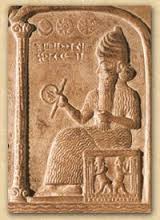
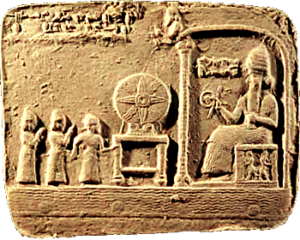 (giant alien Utu; Utu pulls the strings to his “wheel of justice”)
(giant alien Utu; Utu pulls the strings to his “wheel of justice”)
The bright day when Utu the judge ……. …… his pleasure, his fulfillment.
…… the staff of An, in heaven and earth.
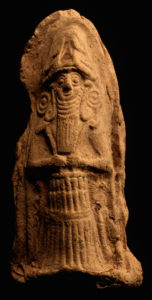
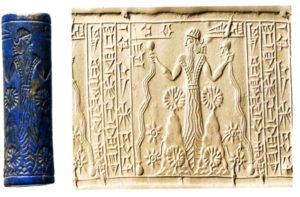 (King Anu; his eldest grandson Marduk)
(King Anu; his eldest grandson Marduk)
…… Marduk …….
approx. 4 lines missing
SEGMENT B
1-14 There …….
2 lines fragmentary
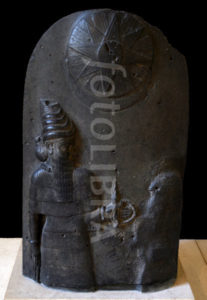
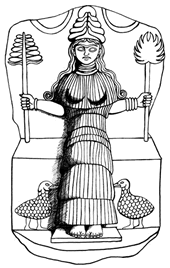 (alien giant Utu & Babylonian king; Nanshe, goddess of birds & fishes)
(alien giant Utu & Babylonian king; Nanshe, goddess of birds & fishes)
Before Utu and Nance …….
Before Abi-Ecuh …….
1 line unclear
…… your divinity ……. …… your lot.
The door …… to the house ……. …… day and night ……. …… from the mouth, its tongue …….
Your personal god …… like life.
Your protective goddess …… life.
…… life …… prayer.
15-30 In those days, in those far-off years ……
The holy hand …… his protective goddess …….
(Nisaba, Enlil’s mother-in-law, Master Scribe & grain goddess; earthling, 2 unidentified gods, Haia-barley god, & his spouse Nisaba)
Nisaba, the lady of Erec (Uruk), ……. …… a jar in which there was barley.
Walking …… …… on roads and routes ……. …… words which he had uttered, ways …….
(Uttu, giant goddess weaver & her workers spinning; ancient weaving loom)
…… a hired worker, like a midwife, a female weaver …….
…… who spoke to Utu ……, …… who spoke to Nanna (Nannar / Sin) …….
(Nannar / Suen & his ziggurat residence, moon crescent giant god of Ur, 2nd son to Earth Colony Commander Enlil)
He who enters a house ……. …… small and great ……. …… sitting on his chair, lying on his bed,
1 line unclear
…… your ways, your personal god …… …… years of life, months of peace in a place of contentment.
Contract for Marriage, Reign of Shamshu-ilu-na, c. 2200 B.C.
Unknown web source
(Texts: All Artifacts, Color Coding, & Writings in Bold Type With Italics Inside Parenthesis, are Added by Editor R. Brown, not the Authors, Translators, or Publishers!)
(gods in blue …mixed-breed demigods in teal…)
This marriage took place about 2200 B.C. The bride was a slave, and gained her freedom by marriage, and hence the penalty imposed upon her in case she divorced her husband is greater than that imposed on him in case he divorced her.
RIMUM, son of Shamkhatum, has taken as a wife and spouse Bashtum, the daughter of Belizunu,
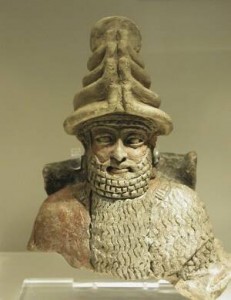 (Shamash / Utu, Nannar’s son, giant patron god of Sippar, symbolized as the Sun god)
(Shamash / Utu, Nannar’s son, giant patron god of Sippar, symbolized as the Sun god)
the priestess (?) of Shamash (Utu), daughter of Uzibitum.
Her bridal present shall be _____ shekels of money.
When she receives it she shall be free.
If Bashtum to Rimum, her husband shall say,
“You are not my husband,” they shall strangle her and cast her into the river.
If Rimum to Bashtum, his wife, shall say,
“You are not my wife,” he shall pay ten shekels of money as her alimony.
They swore by Shamash, Marduk, their king Shamshu-ilu-na, and Sippar…
Contract for Hire of Laborer, Reign of Shamshu-Iluna, c. 2200 B.C.
(Texts: All Artefacts, Color Coding, & Writings in Bold Type With Italics Inside Parenthesis, are Added by Editor R. Brown, not the Authors, Translators, or Publishers!)
(gods in blue …mixed-breed demigods in teal…)
This is a contract from the reign of Shamshu-iluna of the Akkadian dynasty, c. 2200 B.C. It is of many of like character.
MAR-SIPPAR has hired for one year Marduk-nasir, son of Alabbana, from Munapirtu, his mother.
He will pay as wages for one year two and a half shekels of silver.
She has received one half shekel of silver, one se [1/180th of a shekel], out of a year’s wages…
Prayers for Samsu-iluna (Samsu-iluna B): translation
The Electronic Text Corpus of Sumerian Literature
(Texts: All Artifacts, Color Coding, & Writings in Bold Type With Italics Inside Parenthesis, are Added by Editor R. Brown, not the Authors, Translators, or Publishers!)
(gods in blue …mixed-breed demigods in teal…)
1-11 unknown no. of lines missing
Life ……. Life ……. Life ……. …… of your name ……. …… holy life ……. Enki …….
Prince Samsu-iluna (giant mixed-breed offspring made king), ……. …… terrifying splendor which spreads far and wide.
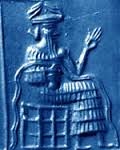 (Enki, King Anu’s eldest & wisest son, Anu’s heir until Enlil’s birth of the “double seed”)
(Enki, King Anu’s eldest & wisest son, Anu’s heir until Enlil’s birth of the “double seed”)
Enki …… your throne, and …… bestow on you a scepter of long years and days; may he …… your crown …… like Utu.
12-19 May your kingship be as stable as heaven and earth!
You are king of numerous lands and peoples!
You are the people’s good shepherd!
You are the herdsman of the settled people!
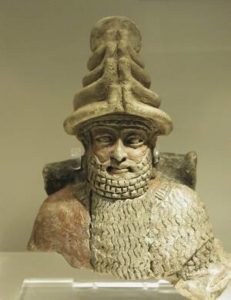 (Utu, son to Nannar, twin to Inanna, Sun god & god of laws)
(Utu, son to Nannar, twin to Inanna, Sun god & god of laws)
When like Utu you impart just verdicts, …… justice, …… you call by name ……, then you, Samsu-iluna,
shall be the king of the eloquent words of Utu, and you shall be the foremost of kings.
20-32 When like a raging storm you batter the foreign lands that are hostile to you,
may your head be raised high, o king; may your head be raised high, o Samsu-iluna!
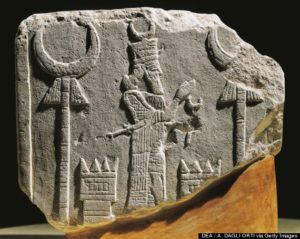 (Nannar, moon crescent god of Ur)
(Nannar, moon crescent god of Ur) 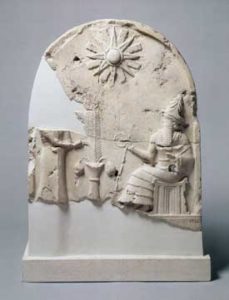 (son Utu, Sun god)
(son Utu, Sun god)
In Babylon, the city of the divine powers (alien technologies) of Suen (Sin / Nannar),
may you let your cleverness shine like the sun!
May Marduk, the god who created you, lift your head high in the midst of lords and princes!
On the field of battle, of mêlée and conflict, may he never stray from your side!
(Marduk upon his dragon symbol, & son Nabu, wars against cousins Inanna, Ninurta, & others)
May he be your helper with weapons (alien high-tech weaponry), may he cause you to excel until distant days!
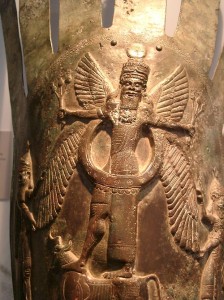 (alien Anunnaki King Anu in his winged sky-disc, father in heaven to main gods on Earth)
(alien Anunnaki King Anu in his winged sky-disc, father in heaven to main gods on Earth)
May An (Anu), king of the gods, make your life last until distant days!
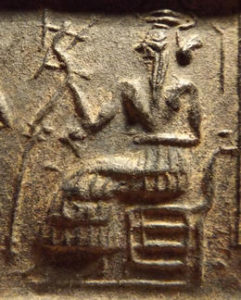 (King Anu’s 2nd son, born of the royal “double seed” law of succession, Earth Colony Commander)
(King Anu’s 2nd son, born of the royal “double seed” law of succession, Earth Colony Commander)
May Enlil, king of the foreign lands, who confirms your words, make your words weighty!
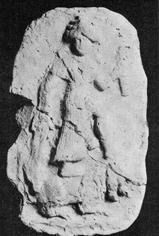 (Inanna upon her war lion / zodiac symbol Leo, with high-tech weaponry in hands)
(Inanna upon her war lion / zodiac symbol Leo, with high-tech weaponry in hands)
May Inana, the great queen of heaven, grasp you firmly with her holy word!
May Enki deliver numerous people into your hands!
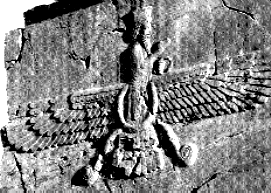 (Ashur / Ahuru-Mazda in his winged sky-disc protecting his king below)
(Ashur / Ahuru-Mazda in his winged sky-disc protecting his king below)
May Asari (Ashur / Osiris, Marduk’s son), the great ruler of the abzu, who provides advice for all the foreign lands,
the lordly one of Eridug, the god who in his …… calls all the …… with a good name — may he be your great princely strength!
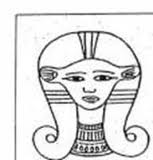 (Ninhursag / Namma, mother to 1/2 brother Enlil’s heir, & to many of twin Enki’s offspring)
(Ninhursag / Namma, mother to 1/2 brother Enlil’s heir, & to many of twin Enki’s offspring)
33-39 May Namma (Ninhursag), the mother who …… the house, place water in your mouth at the …… of the Land!
(Eridu ruins, alien 1st settlement, later Enki’s patron city, tens of thousands of years old; Enki’s Eridu ziggurat / residence drawing)
May Damgalnuna (Enki’s spouse), the great lady of Eridug, when she intercedes joyfully in the good bedchamber,
1 line unclear
pray on your behalf for days of plenty and days …… from her husband.
May the …… deity, the protective goddess of the abzu, be your source of good omens …… for ever and ever!
O Samsu-iluna, my king!
A prayer for Samsu-iluna (Samsu-iluna C): translation
The Electronic Text Corpus of Sumerian Literature
(Texts: All Artefacts, Color Coding, & Writings in Bold Type With Italics Inside Parenthesis, are Added by Editor R. Brown, not the Authors, Translators, or Publishers!)
(gods in blue …mixed-breed demigods in teal…)
1-10 Lord, may you confirm your royal position by taking your seat on the throne, the lofty dais!
Samsu-iluna, may you confirm your royal position by taking your seat on the throne, the lofty dais!
May you strengthen the foundations of your throne by grasping the shepherd’s crook of lordship!
May you bring to perfect completion the princely divine powers (alien advanced technologies)
by inspiring awe in the holy place, the pure place!
When you …… on the holy royal dais, may you lift your head high in a lordly manner!
11-17 When you are embued with the terrifying splendor of royalty, …… shining like the sun!
When you perfectly wield the august divine powers (alien technologies), the great divine powers,
may you be cloaked as if with a mantle in the great awesomeness of royalty!
(Apkulla / pilot, Enki, father King Anu in his sky-disc, Enlil, winged eagle-headed minor god / Apkulla, Tree of Life)
When you come forth in brilliance like the shining day, may An and Enlil determine a great destiny for you!
When you appear like Nanna (Nannar / Sin, moon crescent god of Ur) over the Land,
may the great prince Enki pray on your behalf in his overflowing heart!
18-24 May your headdress sparkle over the Land like Utu!
May your scepter correctly guide the numerous people!
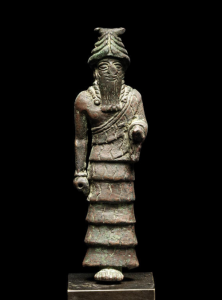 (Nannar, 2nd son to Enlil, father to major gods Utu & Inanna, moon crescent patron god of Ur)
(Nannar, 2nd son to Enlil, father to major gods Utu & Inanna, moon crescent patron god of Ur)
May Suen (Nannar / Sin) let you control the living beings!
With your shepherd’s crook may you lead Sumer and Akkad as if you were their mother and father!
May the widespread people, the people whom you have united, pray to you as you shine like the Barge of Heaven!
May you be the god of the foreign lands that are settled together!
25-40 When you come forth like Utu, joy ……, and their gaze is fixed as if on their own parents.
When you feed them lavishly, may their lives ……!
When you generously give them drink, ……!
May the black-headed people (description of all earthlings at that time) …… cool themselves in your shade!
Your shepherdship …….
1 line fragmentary
2 lines missing
May …… be praised!
May your royal …… be forever stable!
May you be ……!
May you be ……!
May you shine ……!
O Samsu-iluna, my king!
A prayer for Samsu-iluna (Samsu-iluna E): translation
The Electronic Text Corpus of Sumerian Literature
(Texts: All Artefacts, Color Coding, & Writings in Bold Type With Italics Inside Parenthesis, are Added by Editor R. Brown, not the Authors, Translators, or Publishers!)
(gods in blue …mixed-breed demigods in teal...)
1-12 My …… of eternal fame, head lifted high in princely worth, ……
who loves righteousness and truth, …… named with an august name,
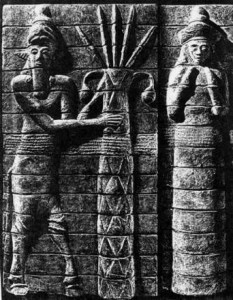 (alien giants Enlil & equal spouse Ninlil images carved into ancient city wall, Earth Commanders)
(alien giants Enlil & equal spouse Ninlil images carved into ancient city wall, Earth Commanders)
for whom Enlil …… has determined a great destiny, and Ninlil ……!
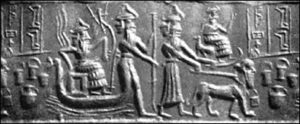 (Enlil, sons Ninurta & Nuska, Bau with her guard dog)
(Enlil, sons Ninurta & Nuska, Bau with her guard dog)
The valiant Ninurta is your helper.
In the E-kur, Nuska the august minister of Enlil, the assembly leader of all lands, is your foremost palace superintendent.
Throughout your life, may you carry your neck high; in princely manner may you lift your head high!
“Prolong the days of his life for Samsu-iluna, of princely worth!”
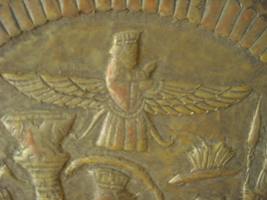
 (Anu in his winged sky-disc; alien Anunnaki King Anu)
(Anu in his winged sky-disc; alien Anunnaki King Anu)
13-29 May An, king of the gods, look upon you favorably; the great and august An (Anu), the father of the gods,
he with the splendid crown, full of great and august radiance, ……
your royal throne whose branches and sprouts …… as wide as the sky.
May he bestow upon you, during the days of your long life, the power to make decisions ……,
to direct ……, to serve as the provider of the black-headed creatures (all current earthlings) in all their multitude!
May Enlil, ……, the king of all countries, protect you …… command.
May he …… for you the city of your country.
May he make firm for you the foundation of your country.
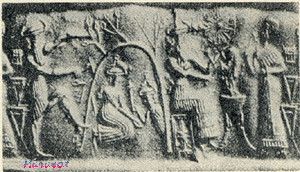 (Nergal, Ninlil, Enlil, Enki, & unidentified giant mixed-breed)
(Nergal, Ninlil, Enlil, Enki, & unidentified giant mixed-breed)
May Ninlil, the queen of deities, joyfully …… for you, and may she look upon you with shining face;
may she who takes counsel …… with Enlil, and who cares for ……, …… her favorable word.
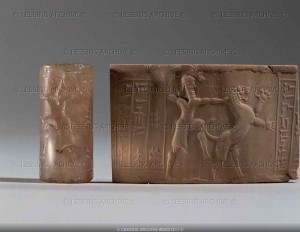
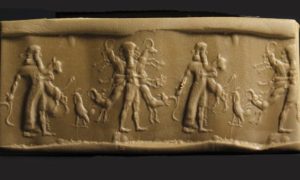 (warrior god Ninurta, Enlil’s eldest son)
(warrior god Ninurta, Enlil’s eldest son)
30-46 May Ninurta, the strong warrior of Enlil, the lord of decisions,
whose august commands are as weighty as those of An and Enlil (alien kingship succession = Anu>Enlil>Ninurta),
he of lordly character, terrifying splendor and heroism, who resists the forceful,
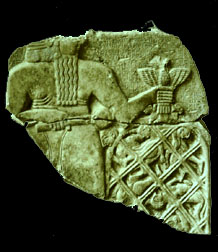 (Ninurta with Anzu in grasp, & earthlings captured in his net / alien technologies)
(Ninurta with Anzu in grasp, & earthlings captured in his net / alien technologies)
the strong shepherd (?) who crushes the evil and wicked —
may he spread out in heaps for you the inhabitants of the cities which you hate, and may he deliver your enemies into your hands!
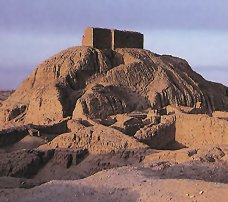
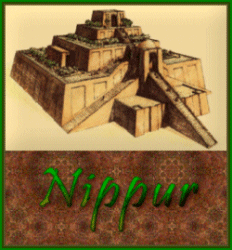 (E-kur, Enlil’s mud-brick-built ziggurat / residence in Nippur)
(E-kur, Enlil’s mud-brick-built ziggurat / residence in Nippur)
May Nuska, the august minister of Enlil, let you enter brick-built E-kur joyfully with your offerings,
and escort you before the shining faces of Enlil and Ninlil;
in Babylon, the city of heroes, may he make firm for you the foundation of your kingship.
The august command …… Enlil ……. ……, may …… be their king!
……, may he …… a place for you!
……, like the light born monthly in the pure sky.
……, and may you too grow throughout your life like a fresh fruit,
o Samsu-iluna, my king!
A prayer for Samsu-iluna (Samsu-iluna G): translation
The Electronic Text Corpus of Sumerian Literature
(Texts: All Artefacts, Color Coding, & Writings in Bold Type With Italics Inside Parenthesis, are Added by Editor R. Brown, not the Authors, Translators, or Publishers!)
(gods in blue …mixed-breed demigods in teal…)
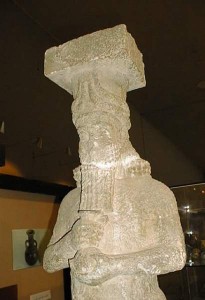
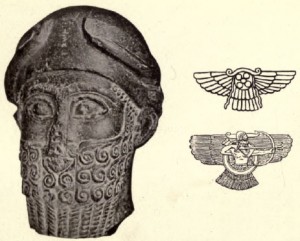 (Enki; grandson Ashur with his sky-disc)
(Enki; grandson Ashur with his sky-disc)
1-6 He greeted Enki, Asalim (Ashur / Osiris) and the son of Eridug
(An Akkadian gloss has: Ea (Enki), Marduk (Enki’s eldest son) and Asalluha (Ashur, Marduk’s eldest son),
the great gods, while sitting majestically on the golden throne of kingship with head high in heroic strength in its midst
(An Akkadian gloss has: on your golden throne of kingship, whose head is raised high in the strength of your heroism,
may you sit majestically, Samsu-iluna, double king),
(Ur with Nannar’s ziggurat / residence; Larsa, Nannar’s patron cities)
the king of Urim (Ur) and king of Larsa, the king of Sumer and Akkad.
Praise Poems of Hammu-rabi (Hammu-rabi A): translation
The Electronic Text Corpus of Sumerian Literature
(Texts: All Artifacts, Color Coding, & Writings in Bold Type With Italics Inside Parenthesis, are Added by Editor R. Brown, not the Authors, Translators, or Publishers!)
(gods in blue …mixed-breed demigods in teal…)
SEGMENT A
unknown no. of lines missing
1-171 line damaged
…… acting as its lord ……
7 lines damaged
…… the black-headed …….
…… the Euphrates …….
…… the Tigris …….
…… on the banks of the Irnina watercourse …….
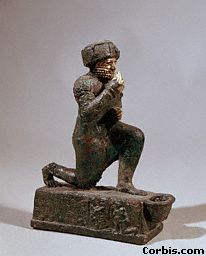 (mixed-breed giant Hammurabi, chosen by alien gods to be king of Babylonia)
(mixed-breed giant Hammurabi, chosen by alien gods to be king of Babylonia)
King Hammu-rabi …… Gibil (Enki’s son) (the god of fire).
Enlil ……. Enki …… heroism.
(semi-divine made king standing before giant Suen / Nannar, moon crescent patron god of Ur; Earth’s 1st cities of ancient Sumer)
Suen (Sin / Nannar) …….
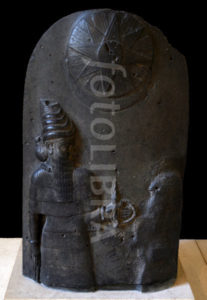 (giant Sun god Utu, & mixed-breed smaller giant made king Hammurabi, a go-between for the gods)
(giant Sun god Utu, & mixed-breed smaller giant made king Hammurabi, a go-between for the gods)
18-24 Utu the sorcerer ……
1 line damaged
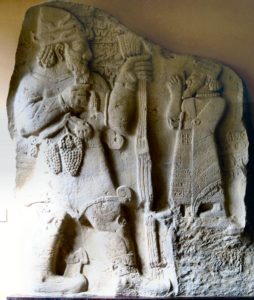 (Ishkur / Adad, Nannar’s brother, thunder god, & smaller giant mixed-breed made king)
(Ishkur / Adad, Nannar’s brother, thunder god, & smaller giant mixed-breed made king)
…… his favorite ……. Ickur (Adad) …… heroism.
(mixed-breed giant king stands before bigger giant Marduk, patron god of Babylon)
Marduk …… strength (?).
(alien winged sky-disc above, controlling everything on the ground)
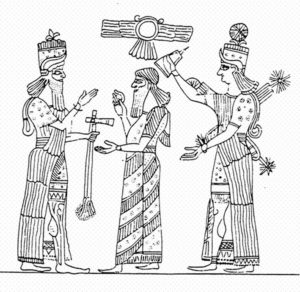 (alien giant Adad, giant mixed-breed made king, & bigger giant goddess Inanna)
(alien giant Adad, giant mixed-breed made king, & bigger giant goddess Inanna)
Inana …… divine powers (alien technologies).
…… reverent ……
1 line damaged
unknown no. of lines missing
SEGMENT B
1-5 5 fragmentary lines
unknown no. of lines missing
SEGMENT C
1-171 line damaged
…… humanity …….
5 lines damaged
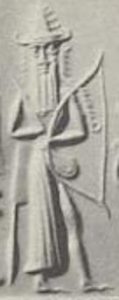
 (Enlil & his “Great Mountain” / residence in Nippur)
(Enlil & his “Great Mountain” / residence in Nippur)
…… the Great Mountain (Enlil) …….
1 line damaged
…… the divine powers (alien technologies) of kingship …….
1 line damaged
…… Enlil …….
1 line damaged
…… acting as its lord (?).
3 lines damaged
unknown no. of lines missing
SEGMENT D
1-17 1 line damaged
 (Enki, elder brother to Enlil, oldest & wisest alien god on Earth, 1st one sent to colonize the planet)
(Enki, elder brother to Enlil, oldest & wisest alien god on Earth, 1st one sent to colonize the planet)
…… Enki …….
…… emerging from the Land.
…… befitting divinity …….
3 lines damaged
…… joyous …….
…… praising with their songs …….
…… your statue shall not be brought in ……
2 lines damaged
…… formed your heart for Enlil (?).
…… enter …….
…… precious destinies …….
2 lines damaged
unknown no. of lines missing
SEGMENT E
1-4 4 fragmentary lines
unknown no. of lines missing
SEGMENT F
1-22 1 line damaged
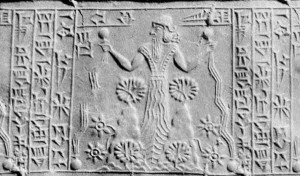 (giant Marduk, patron lord over Babylon & Egypt)
(giant Marduk, patron lord over Babylon & Egypt)
…… its prince (?) Marduk who …….
…… curse …….
…… great wrath ……
Marduk …….
…… midst of the great gods ……
1 line damaged
…… weapon …….
1 line damaged
…… brickwork (?) …….
9 lines damaged
…… portion …….
1 line damaged
…… the black-headed (description used by alien Anunnaki for earthlings, all having black hair, while the gods have brown, black, blonde, etc. colored hair, & variety of eye colors as we now have on Earth today) …….
1 line damaged
unknown no. of lines missing
A praise poem of Hammu-rabi (Hammu-rabi C): translation
The Electronic Text Corpus of Sumerian Literature
(Texts: All Artifacts, Color Coding, & Writings in Bold Type With Italics Inside Parenthesis, are Added by Editor R. Brown, not the Authors, Translators, or Publishers!)
(gods in blue …mixed-breed demigods in teal…)
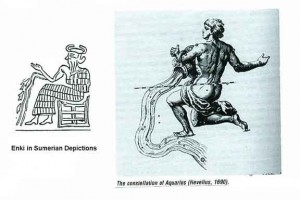 (Enki, god of waters, his zodiac symbol Aquarius)
(Enki, god of waters, his zodiac symbol Aquarius)
1-7 Enki has esteemed him truly in the shrine, the august place — the king who loves purification rites
and is well-suited to the pure divine powers (alien technologies),
the king who is skilled in the precious plans, who is reverent,
eloquent and deft (?), the shepherd, favorite of lord Nunamnir (Enlil) and beloved of mother Ninlil, who ……
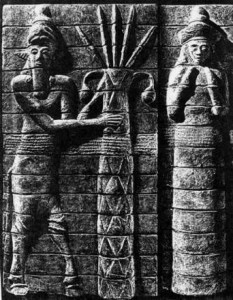 (Earth Colony Commander Enlil & equal spouse Ninlil carved into ancient city wall)
(Earth Colony Commander Enlil & equal spouse Ninlil carved into ancient city wall)
great food offerings in E-kur, who delights (?) the great prince Enki, ……,
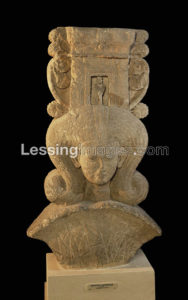 (Ninhursag, sister-lover to Enki, mother to Ninurta, son & heir to her 1/2 brother Enlil)
(Ninhursag, sister-lover to Enki, mother to Ninurta, son & heir to her 1/2 brother Enlil)
who is cherished by holy Damgalnuna (Ninhursag): the good shepherd (King) Hammu-rabi.
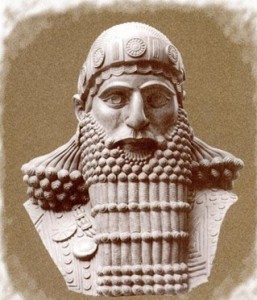 (Hammurabi images placed in many locations of Washington D.C.)
(Hammurabi images placed in many locations of Washington D.C.)
8-14 The king has …… everything in the shrine E-kic-nujal.
Hammu-rabi, whose …….
 (giant goddess Ningal, giant mixed-breed Ur-Nammu made king, damaged images of his mother-goddess Ninsun, king again, & giant Nannar, the king & patron gods of Ur)
(giant goddess Ningal, giant mixed-breed Ur-Nammu made king, damaged images of his mother-goddess Ninsun, king again, & giant Nannar, the king & patron gods of Ur)
Daily he …… Nanna (Nannar / Sin) and Ningal (Nannar’s spouse).
The king whose joy is …… has restored the purification rites, plans and divine powers (alien technologies) …….
He will stand there before you ……,

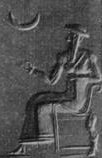 (alien giant Nannar, moon crescent god of Ur)
(alien giant Nannar, moon crescent god of Ur)
o youth Suen (Nannar / Sin), fulfilling …… all your requirements (kings fully directed by alien gods).
A prayer for Hammu-rabi (Hammu-rabi D): translation
The Electronic Text Corpus of Sumerian Literature
(Texts: All Artifacts, Color Coding, & Writings in Bold Type With Italics Inside Parenthesis, are Added by Editor R. Brown, not the Authors, Translators, or Publishers!)
(gods in blue …mixed-breed demigods in teal…)
unknown no. of lines missing
1-6 1 line damaged
….. the reverent one, who takes care ……,
1 line damaged
(The gods are addressed:)
“Give him the scepter ……! …… the name of Babylon, the city of lordship!
Make the king pre-eminent in the world ……!”
(Marduk upon his dragon symbol, giant son Nabu, & giant mixed-breed made king brings dinner from the mountains)
7 O Asarluhi (Marduk), …… destiny for my Hammu-rabi!
(Apkulla / pilot, Enki, father King Anu in his winged sky-disc, Anu’s son & heir Enlil, & winged eagle-headed pilot / Apkulla, minor god)
8-13 An (Anu), Enlil and Enki …… with him.
When they had decided ……, all the great gods together …… joyfully to Marduk.
 (Royal Blooded descendants of King Anu stationed on Earth Colony, the “main gods & goddesses” upon their animal symbols)
(Royal Blooded descendants of King Anu stationed on Earth Colony, the “main gods & goddesses” upon their animal symbols)
(Marduk speaks to the great gods:)
“You have …… the shepherd of your hearts to exercise the lordship in the Land.
Determine his destiny grandly, …… with your holy mouths.
Appoint …… your word …… for him, the indefatigable shepherd.”
14-25 (The great gods speak:)
“We name him king in the four quarters of the world …….
(the “Law Code of Hammurabi” is given to him for the earthlings of Babylon to follow, by alien giant god Utu, the Sun god)
Hammu-rabi, humble prince acceptable to the gods (a mixed-breed who is loyal to them), …… our word,
we grant you authority over the black-headed (much smaller non-mixed earthlings, only giant mixed-breed offspring allowed as king, queen, high-priest, or high-priestess, go-betweens for the alien giants, positions of authority over all other earthlings);
may your name …… the limits of heaven ……!
…… the inhabitants of the Land, keeping in order ……!
May your reign endure ……, may it …… a shining barge!
May your shepherding …… be firm, and may the people …… in the pastures!
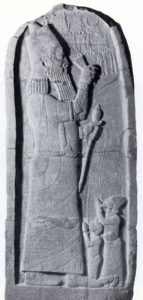
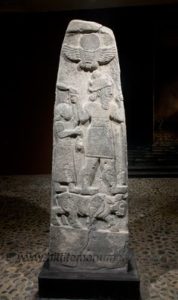 (alien giant god & king with spouse on knees; Ishkur / Adad with winged sky-disc)
(alien giant god & king with spouse on knees; Ishkur / Adad with winged sky-disc)
Peerless king, your roar of triumph is like Ickur (Ishkur / Adad the thunder god), covering ……!
Your mouth is the fiery god of fire (Enki’s son Gibil, god who taught mankind use of the kilns), …… below and in the uplands …….
May youthful Utu be your helper, …….
May he always go at your right side and favor you.
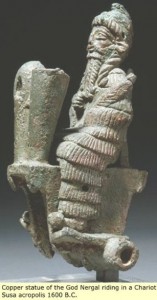
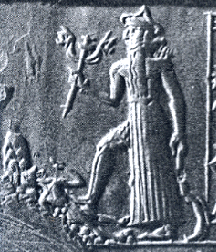 (Nergal in his sky-chariot; warrior god Nergal with high-tech alien weaponry)
(Nergal in his sky-chariot; warrior god Nergal with high-tech alien weaponry)
…… in your ……, Erra (Nergal)……. Hammu-rabi, you should put your trust in our august commands, …….”
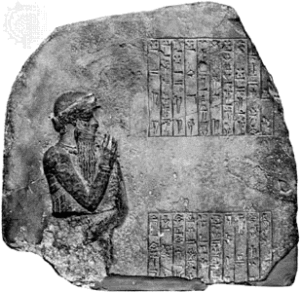 (the great giant Babylonian King Hammurabi, & his cuneiform inscription)
(the great giant Babylonian King Hammurabi, & his cuneiform inscription)
26-37 Hammu-rabi …… the command of An and Enlil (follow their orders or face terrible consequences!), …… of heaven and earth,
…… throughout the world ……. An and Enlil …… to the king.
Among the great gods, Asarluhi (Marduk, Enki’s eldest son) ……. In Babylon, the city, the precinct, the pure dwelling …….
…… foundation, the great dais, the beloved and august dwelling, in joy …….
…… the noble son of the gods, …… royal name, …… they firmly spoke their consent to him.
(goddess, Utu climbing the ziggurat of grandfather Enlil, Enlil on his throne)
When they ……, they …… the power of Enlil over the numerous people.
…… they manifested his destiny, …… the life of the Land.
They magnified Hammu-rabi, their benign shepherd, and …… over all the black-headed (simply, all earthlings).
…… him whom Enki has …… his favor in the Land,
1 line damaged
unknown no. of lines missing
A Prayer for Hammu-rabi (Hammu-rabi E): translation
The Electronic Text Corpus of Sumerian Literature
(Texts: All Artifacts, Color Coding, & Writings in Bold Type With Italics Inside Parenthesis, are Added by Editor R. Brown, not the Authors, Translators, or Publishers!)
(gods in blue …mixed-breed demigods in teal…)
1-37 37 lines missing
38-47 1 line fragmentary
…… raised his head high.
…… before him …… rejoiced at him.
…… embraced him.
Your …… has determined the destiny.
May you be their ……, exercising lordship over them.
May …… which has been bestowed on you never cease.
You are well-suited for ……, and may its time be prolonged for you.
A destiny has been determined for you and you have been called by name; may you have no rival!
